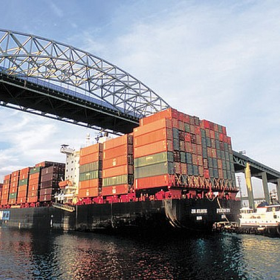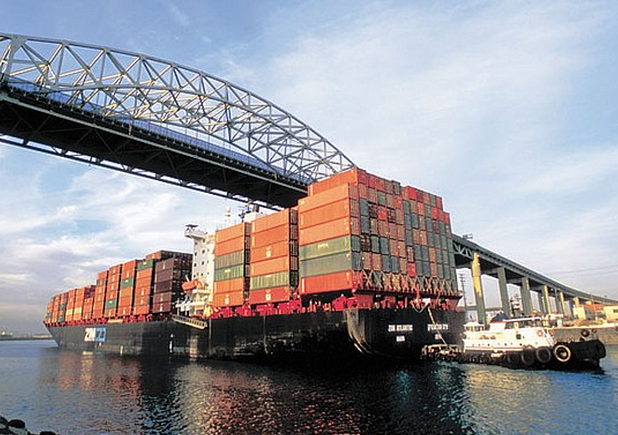
Photo courtesy of apparelnews.media.clients.ellingtoncms.com
Most Republicans and moderate Democrats have supported free trade in recent years, wanting the United States to trade with other countries without restrictive tariffs – taxes placed on foreign manufactured goods imported into the country. Tariffs act as subsidies for American companies, allowing them to increase profits because the tariffs make foreign products cost more, and thus less attractive to customers. Historically, American companies seldom distribute these profits to their workers. The lack of foreign competition also allows American companies to raise prices on their products, which hurts consumers.[ref]Doris Kearns Goodwin, The Bully Pulpit: Theodore Roosevelt, William Howard Taft, and the Golden Age of Journalism, Simon and Schuster, 2013, Print.[/ref]
During the 1970s, globalization and new technology ignited a critical development in the American economy. New machinery allowed companies to hire fewer workers. At the same time, items ranging from phones to cars has become a global effort to assemble. “Everything is coming from everywhere. There is not any such thing as an American car or a British car,” said former Labor Secretary Robert Reich. “Everything, parts for almost every product, are coming from all over the world.”[ref]”Robert Reich Explains How Globalization, Technology, and Natural Resources are Reshaping Global Economy,” Georgia Straight Vancouver’s News & Entertainment Weekly, Oct. 4 2013, accessed August 27, 2015.[/ref] Globalization allows corporations to easily transfer manufacturing jobs to less developed countries with a lower standard of living than the United States. Corporations can pay these foreign workers less than an American worker because they do not require as much money to support their lifestyle. This raises the standard of living in underdeveloped countries, and gives American consumers access to cheaper products. New York Times columnist David Brooks argues that, “there is no question [free trade has] a positive impact on people in the poorer [nations].”[ref]David Brooks, “The Democratic Tea Party,” The New York Times, June 15, 2015, accessed Aug. 25, 2015.[/ref] He also argues that, “in Asia, the American-led open trade era has created the greatest reduction in poverty in human history. The Pacific trade deal would lift the living standards of the poorest Asians, especially the 90 million people of Vietnam.” Higher standards of living means more stability in developing countries. Trade that expands economic ties between countries also reduces the likelihood of international conflict.
Unfortunately, the American working class is weakened as manufacturing jobs move overseas. Democratic Presidential candidate Bernie Sanders said that, “as a result of [the North American Free Trade Agreement], the US lost nearly 700,000 jobs.”[ref]Sanders Bernie, “Senator Bernie Sanders: The Trans-Pacific Trade (TPP) Agreement Must Be Defeated,” Aug. 27, 2015.[/ref]This is why he advocates for protectionist economic policies. He argues that raising tariffs on our free trading partners will force corporations to bring manufacturing jobs back to the United States. Populist candidates are outraged over President Obama’s Pacific Trade Partnership, a free trade deal between the United States and 12 other countries along the Pacific Rim. This strategic partnership does not include China and India. Foreign policy expert Ian Bremmer says that the TPP will lower foreign tariffs and boost American “exports by 4.39 percent by 2025. That matters because exports create the kind of middle class jobs that boost longer-term growth and reduce income inequality. TPP would also give the U.S. a firmer commercial foothold in the world’s most economically dynamic region. And it would do so while growing the economies of U.S. partners and allies, which are anxious to avoid overdependence on fast-expanding China.”[ref]Ian Bremmer, “Ian Bremmer on the Surprising Importance of the TPP,” Time, Apr. 14, 2015, accessed Aug. 27, 2015.[/ref] The vendetta is participating in free trade while minimizing the loss of American jobs.
A significant aspect of America’s trade imbalance involves China, currently America’s largest trading partner. According to Leo Gerard, the president of the United Steelworkers, “China diminishes the value of its currency. This gives its exporting industries a boost while simultaneously blocking imports. In turn, this then protects the Asian giant’s manufacturers and its workers’ jobs.”[ref]Leo Gerard, “China Protects Its Workers; America Doesn’t Bother,” The Huffington Post, Aug. 17, 2015, accessed Aug. 27, 2015.[/ref] China keeps the value of its currency artificially low. If they restored it to its actual worth, “Chinese exports would become more expensive to [Americans] and [American] exports would be relatively cheaper to [the Chinese]. This would help shrink the trade imbalance.”[ref]Robert Reich, “Why Getting Tough With China Won’t Solve Our Jobs Problem,” Sept. 10 2010, accessed Aug. 26, 2015.[/ref] By subsidizing its nation’s industries, the Chinese government stimulates the creation of steel, paper, and other materials. The result is that, “the international market is flooded with underpriced Chinese steel, threatening American steel mills and tens of thousands of American steelworkers’ jobs.”[ref]Leo Gerard, “China Protects Its Workers; America Doesn’t Bother,” The Huffington Post, Aug. 17, 2015, accessed Aug. 27, 2015.[/ref] The United Steelworkers have taken steps to challenge China’s violation of international trade rules. United Steelworkers won several cases against the Chinese government and the Obama Administration applied limited tariffs on Chinese tires from 2009 to 2012. Countering illegal trade policies remains a pragmatic use of tariffs in a globalized world, although some fear that the Chinese government could retaliate by selling large amount of US Treasury securities, causing American borrowing costs to soar. [ref]Robert Reich, “Why Getting Tough With China Won’t Solve Our Jobs Problem,” Sept. 10, 2010, accessed Aug. 26, 2015.[/ref] The solution is to “include sanctions for currency manipulation in the TPP.”[ref]Leo Gerard, “China Protects Its Workers; America Doesn’t Bother,” The Huffington Post, Aug. 17, 2015, accessed Aug. 27, 2015.[/ref] Expanding free trade but enforcing sanctions when deals are violated is in the best interest of the American working class.
Take Action:
To support free trade, sign this petition at “Freedom to Trade.”




